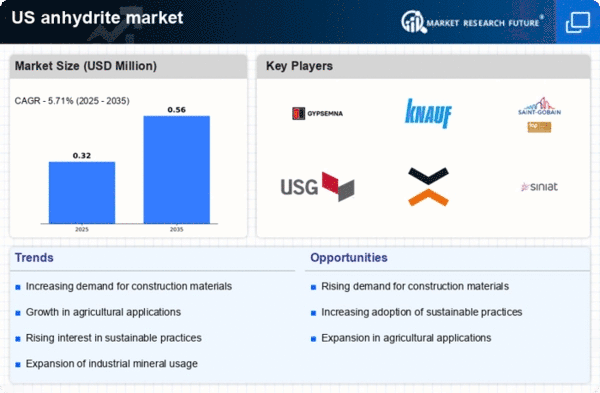Rising Demand in Construction Sector
The anhydrite market is experiencing a notable surge in demand driven by the construction sector. As infrastructure projects expand across the United States, the need for high-quality building materials, including anhydrite, is increasing. Anhydrite serves as a key component in the production of cement and gypsum products, which are essential for construction. In 2025, the construction industry is projected to grow by approximately 5% annually, further propelling the demand for anhydrite. This growth is likely to be fueled by government investments in public infrastructure and housing projects, which are expected to reach $1 trillion by 2027. Consequently, the anhydrite market is poised to benefit significantly from this upward trend in construction activities.
Expanding Applications in Agriculture
The agricultural sector is increasingly recognizing the benefits of anhydrite, contributing to the growth of the anhydrite market. Anhydrite is utilized as a soil amendment, enhancing soil structure and nutrient availability. With the rising focus on sustainable farming practices, the demand for natural soil conditioners is on the rise. In 2025, it is anticipated that the use of anhydrite in agriculture could increase by 15%, driven by the need for improved crop yields and soil health. This trend is particularly relevant as farmers seek alternatives to chemical fertilizers, aligning with the broader movement towards organic farming. Consequently, the agricultural applications of anhydrite are expected to play a pivotal role in the market's expansion.
Technological Innovations in Processing
Technological advancements in the processing of anhydrite are reshaping the anhydrite market. Innovations in extraction and processing techniques have led to improved efficiency and reduced costs. For instance, the introduction of automated systems and advanced machinery has streamlined production processes, allowing for higher purity levels and better quality control. In 2025, it is projected that the adoption of these technologies could enhance production capacity by up to 20%. This increase in efficiency not only meets the growing demand but also positions manufacturers to compete effectively in the market. As a result, the anhydrite market is likely to see a boost in both supply and quality, catering to diverse applications.
Increased Focus on Sustainable Materials
The anhydrite market is witnessing a shift towards sustainable materials, as environmental concerns gain prominence. Anhydrite, being a natural mineral, is increasingly favored for its low environmental impact compared to synthetic alternatives. The construction industry is actively seeking materials that contribute to green building certifications, such as LEED. In 2025, it is estimated that 30% of new construction projects will prioritize sustainable materials, including anhydrite. This trend aligns with the broader movement towards eco-friendly practices, which is likely to enhance the market's appeal. As more companies adopt sustainable practices, the demand for anhydrite is expected to rise, positioning it as a preferred choice in the anhydrite market.
Regulatory Support for Mineral Extraction
Regulatory frameworks in the United States are increasingly supportive of mineral extraction, positively impacting the anhydrite market. Recent policy changes aim to streamline the permitting process for mining operations, thereby facilitating easier access to anhydrite resources. This regulatory environment is expected to encourage investment in mining infrastructure, leading to increased production capacity. In 2025, it is projected that the number of active anhydrite mines could rise by 10%, driven by favorable regulations and incentives for sustainable mining practices. As a result, the anhydrite market is likely to benefit from enhanced supply stability and reduced operational costs, positioning it favorably for future growth.
















